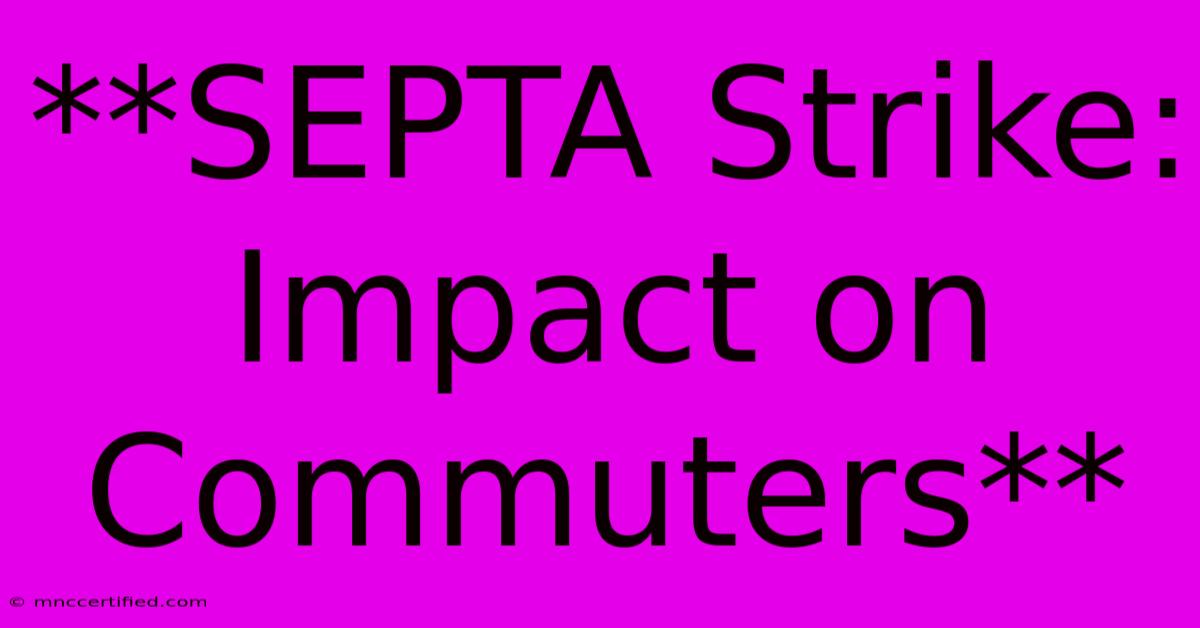**SEPTA Strike: Impact On Commuters**

Table of Contents
SEPTA Strike: A Major Disruption for Philadelphia Commuters
The recent SEPTA strike has brought Philadelphia's transportation system to a standstill, impacting thousands of commuters who rely on the regional transit authority for their daily commutes. The strike, which began on [Insert Date], has caused widespread disruption, forcing many to scramble for alternative transportation options.
The Impact on Commuters:
The strike has had a significant impact on the lives of Philadelphia commuters, creating a cascade of challenges:
- Increased Travel Time: Commuters relying on SEPTA's buses, trains, and trolleys are now facing significantly longer travel times.
- Increased Transportation Costs: Many are forced to use expensive alternatives like ride-sharing services, taxis, or private cars, leading to a steep increase in commuting costs.
- Disruption to Work and Daily Life: The strike has caused widespread disruption to work schedules, school attendance, and other daily activities.
- Stress and Frustration: The uncertainty surrounding the strike, the added burden of finding alternative transportation, and the overall disruption to daily routines have caused significant stress and frustration among commuters.
Alternative Transportation Options:
With SEPTA services halted, commuters have been exploring a range of alternative transportation options:
- Ride-Sharing Services: Uber and Lyft have seen a surge in demand, but this often comes with inflated prices and long wait times.
- Taxis: Taxis are another option, but availability can be limited, and costs can be exorbitant during peak hours.
- Carpooling: Many commuters are turning to carpooling to share the burden of transportation costs and reduce congestion.
- Cycling: Cycling is a viable option for some commuters, but it's not suitable for everyone, especially during inclement weather.
- Walking: While a healthy option, walking is only feasible for short distances and may not be practical for all commuters.
The Economic Impact:
The SEPTA strike has not only impacted individuals but also businesses in Philadelphia:
- Reduced Productivity: The strike has led to reduced productivity in many industries, as employees struggle to reach their workplaces on time.
- Lost Revenue: Businesses reliant on public transportation are experiencing a decline in foot traffic and revenue.
- Increased Costs: Businesses are facing increased costs for alternative transportation arrangements for their employees.
Looking Ahead:
The SEPTA strike highlights the critical role public transportation plays in the economic and social fabric of Philadelphia. Finding a solution to the current impasse and ensuring the long-term sustainability of SEPTA is crucial to avoid future disruptions and ensure a smooth functioning city.
Keywords: SEPTA strike, Philadelphia commuters, transportation disruption, alternative transportation, ride-sharing, carpooling, cycling, walking, economic impact, productivity loss, revenue decline, public transportation, sustainability.
Note: This article is a general overview. For the most up-to-date information on the SEPTA strike, please refer to official SEPTA sources and news outlets.

Thank you for visiting our website wich cover about **SEPTA Strike: Impact On Commuters** . We hope the information provided has been useful to you. Feel free to contact us if you have any questions or need further assistance. See you next time and dont miss to bookmark.
Featured Posts
-
Hamass Goals Vs Palestinian Welfare
Nov 08, 2024
-
Is Laser Dentistry Covered By Insurance
Nov 08, 2024
-
Outer Banks Season 4 Potential Spinoffs Explored
Nov 08, 2024
-
Pakistan Wins By 9 Wickets In 2nd Odi
Nov 08, 2024
-
Job Description Of Insurance Coordinator
Nov 08, 2024